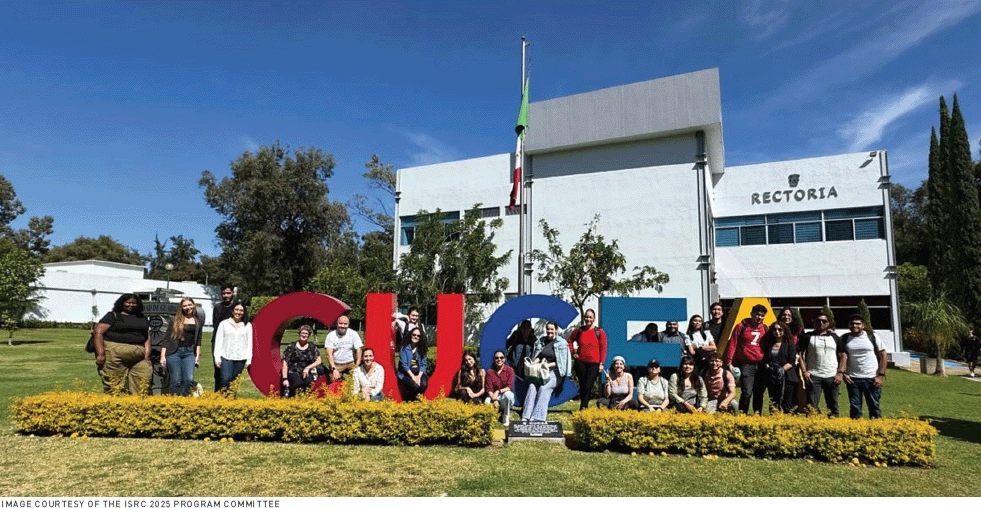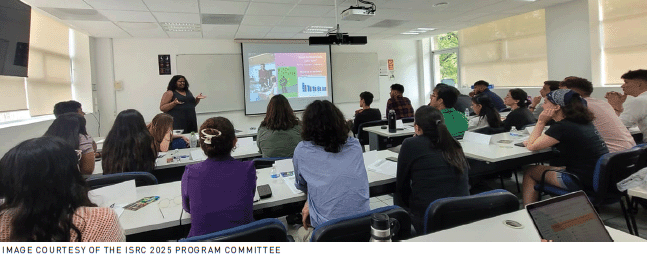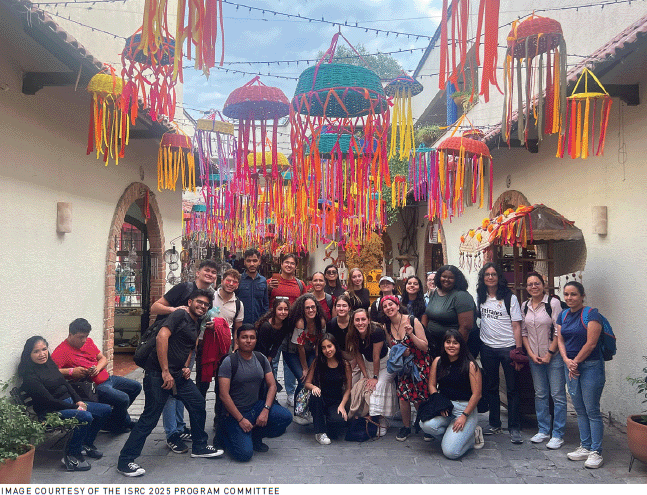Authors:
Karla Badillo-Urquiola, Laura S. Gaytán-Lugo, Roció Maciel Arellano
Most computer science departments across the globe don't have a mandatory course on ethics or social impact [1,2]. Computer scientists, though, are quickly developing and advancing new technologies that are shaping our world and society. This rapid advancement has sparked conversations around responsible computing—a field dedicated to ensuring that technology is not only developed and used in ways that are ethical and sustainable but also beneficial to humanity, fostering systems that strengthen justice, security, and accessibility for all [3]. Yet it still remains an evolving and loosely defined term. With funding from the University of Notre Dame's Mexico Faculty Grant Program and the Mozilla Foundation, a team of experts from the University of Notre Dame and leading universities in western Mexico—Universidad de Colima, Universidad de Guadalajara, Universidad Michoacana de San Nicolás de Hidalgo, and Universidad Panamericana—hosted the first International School on Responsible Computing (ISRC; https://isrc24.weebly.com), a four-day program for faculty and students to come together and learn about interdisciplinary and global-oriented approaches to responsible computing.
We recognize that the landscape of responsible computing education is complex. Therefore, we reflect on the lessons learned from the deep conversations held during the event as a way to document our experiences and share opportunities for improving responsible computing education with the broader HCI community. Key themes that emerged as fundamental pillars for shaping a more inclusive, effective, and robust approach include fostering self-reflection, interdisciplinary collaboration, cultural inclusion, and ensuring broad access. In the following sections, we explore the significance and practical implications of each of these ideas.
 Why Self-Reflection Matters in Responsible Computing
Why Self-Reflection Matters in Responsible Computing
The courses and lectures allowed students to gain a deeper understanding of how decisions in technology design affect society. Students reflected on the importance of ethics, privacy, equity, and accessibility in technological development. Throughout the week, discussions surfaced on the ethical dilemmas, regulations, and influence of emerging technologies, such as artificial intelligence. Through these discussions, participants reflected on the societal role of engineers, technologists, and data scientists, including their own responsibility in developing more inclusive and ethical technologies.
In the ethics course, during an activity exploring generative AI, we saw how social inequalities were strongly reflected in the data used to train different models. I learned about a wide variety of AI-related issues that I had no idea were harmful today, as well as different projects and work ethics being proposed to address them. I was able to reflect on the importance of working with data that captures population diversity and to develop tools that align with such heterogeneity. I really liked the team of professors and researchers and seeing all the areas in which one can work within computing. It especially motivates me to do research in HCI once I finish my degree.
— Student from Argentina
Most computer science departments across the globe don't have a mandatory course on ethics or social impact.
Self-reflection allowed students to examine their biases, assumptions, and actions in the context of technology, prompting them to consider the impact of their work, designs, and decisions on others and on society. Without this critical examination, we risk perpetuating harmful practices and unintended consequences. We encourage the HCI community to consider taking the time to reflect when integrating a responsible computing education curriculum.
 Responsible Computing Requires Interdisciplinary Collaboration and Cultural Inclusion
Responsible Computing Requires Interdisciplinary Collaboration and Cultural Inclusion
By bringing together students and experts from various disciplines and cultures, the program highlighted the value of diverse perspectives in responsible computing. Participants learned that addressing technological challenges from a single viewpoint can be limiting and that interdisciplinary dialogue is essential for developing well-rounded solutions. Additionally, interactions with researchers, technology professionals, and fellow students expanded their professional networks, opening doors to future collaborations.
The ISRC allowed us to dive deeper into questions of socially responsible computing, but in a learning environment that put every student a little outside their comfort zone. By setting the school in Mexico but teaching the courses in English, non-Mexican participants faced the challenge of navigating a new culture, while the Spanish speakers grappled with the complexities of learning in a non-native language. This shared experience of navigating a new culture or language created a powerful sense of empathy and solidarity, pushing us to grow together. By understanding experiences different from our own, we can better grasp the global impact of the technologies we build.
— Student from the U.S.
 | Participants of ISRC 2024. |
It is essential to continue fostering discussions that embrace diverse perspectives and expand professional relationships to develop meaningful and responsible solutions that tackle today's most pressing technological challenges.
 Recognizing Barriers to Access in Responsible Computing
Recognizing Barriers to Access in Responsible Computing
The unequal distribution of knowledge and technological resources among the participants sparked important conversations. Discussions revealed disparities in understanding responsible computing. Some participants were already familiar with the topic, while others encountered the concepts for the first time. Those who were unfamiliar with the concepts were in degree programs that do not offer courses in technology ethics or responsible computing. Financial and institutional differences further compound this inequity, limiting access to advanced tools, computing infrastructure, and hands-on learning. Recognizing these inequities reinforced the need to develop a transformative curriculum that trains and equips students in ethical thinking to address the ever-emerging concerns of technology.
Sin duda fue una experiencia que abonó a mi formación como alumna de posgrado, y me encantaría poder participar en ejercicios similares. La escuela me permitió no sólo aprender, convivir, y aplicar mis conocimientos sino también enfrentarme al hecho de comunicarme en un idioma distinto, con personas con conocimientos complementarios a los míos y con mucho que enseñar. Cómputo responsable no era un término que yo conociera, pero que ahora trato de tener presente en mi ámbito profesional.
(It was undoubtedly an experience that contributed to my development as a graduate student, and I would like to participate in similar projects. The International School on Responsible Computing allowed me not only to learn, interact, and apply my knowledge but also to confront the challenge of communicating in a different language, with people whose knowledge complements my own and who had much to teach. Responsible computing was not a term I was familiar with, but I now try to keep it in mind in my professional field.)
— Student from Mexico
Students left the program with new ways of thinking that fundamentally reshaped their commitments to design more inclusive and equitable technological solutions.
Overall, the experience provided students with both technical knowledge (e.g., tools for evaluating ethical, social, and environmental impacts of technology) and a broader, more human-centered perspective on computing—an essential aspect of developing ethical, accessible, and responsible technologies. Students left the program with new ways of thinking that fundamentally reshaped their commitments to design more inclusive and equitable technological solutions that bridge the gaps between societal needs and technological innovation.
 | Ethics course: Exploring generative AI activity. |
 | Exploring Tlaquepaque. |
The inaugural International School on Responsible Computing served as a crucial first step in addressing the urgent need for ethical considerations within computer science. By fostering self-reflection, promoting interdisciplinary collaboration, emphasizing cultural inclusion, and acknowledging the barriers to access, the program provided a valuable platform for exploring the multifaceted nature of responsible computing. The experiences and insights shared by participants underscore the importance of integrating these core principles into computer science education. Moving forward, it is imperative that the HCI community embraces these lessons, prioritizing the development of curricula and programs that equip future technologists with the skills to innovate and instill in them a deep sense of responsibility for the impact of their creations on a global scale. The conversations initiated at ISRC must continue, evolving into concrete actions that shape a future where technology serves humanity in a truly ethical, sustainable, and inclusive manner.
We thank the following individuals for their contributions and collaboration in making the first International School on Responsible Computing a success: Adriana L. Iñiguez-Carrillo, Cuauhtémoc Rivera-Loaiza, Carol Smith, Ricardo Baeza-Yates, Flor López, Verónica Gutiérrez, Edgar Ruvalcaba, Jafet Rodríguez, Megan Levis, Emnet Tafesse, Silvia B. Fajardo-Flores, Pedro C. Santana-Mancilla, Katherine Walden, and Cecilia Corrales Vega.
This work was partially supported by Notre Dame Global's Mexico Faculty Grant Program, Notre Dame's Institute for Latino Studies, the ACM Distinguished Speakers Series, Universidad de Guadalajara, Universidad Panamericana, and the Responsible Computing Challenge, a partnership of Omidyar Network, Mozilla, Schmidt Futures, Craig Newmark Philanthropies, and the Mellon Foundation. Any opinions, findings, conclusions, or recommendations expressed in this article are those of the authors and do not necessarily reflect the views of our sponsors.
1. D'Agostino, S. In class, some colleges overlook technology's dark side. Inside Higher Ed. Nov. 16, 2023; https://bit.ly/3ZvOvVs
2. Stavrakakis, I. et al. The teaching of computer ethics on computer science and related degree programmes: A European survey. International Journal of Ethics Education 7, 1 (2022), 101–129; https://doi.org/10.1007/s40889-021-00135-1
3. National Academies of Sciences, Engineering, and Medicine. Fostering Responsible Computing Research: Foundations and Practices. National Academies Press, 2022.
Karla Badillo-Urquiola is a Clare Boothe Luce Assistant Professor of computer science and engineering at the University of Notre Dame. She is a member of the ACM SIGCHI Latin American HCI Community and an HCI expert investigating how technologies affect people, organizations, and communities. [email protected]
Laura S. Gaytán-Lugo is an assistant professor at the Universidad de Colima. She currently serves as Secretary of the Executive Committee of the Mexican HCI Association. Her research focuses on the design of interactive materials to support skill development and learning. [email protected]
Rocío Maciel Arellano is a research professor at the Universidad de Guadalajara. Her research focuses on smart cities. She is a member of the National System of Researchers in Mexico. [email protected]
Copyright 2025 held by owners/authors
The Digital Library is published by the Association for Computing Machinery. Copyright © 2025 ACM, Inc.






Post Comment
No Comments Found